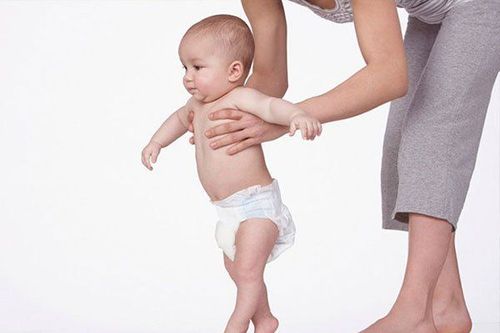This is an automatically translated article.
The article was professionally consulted by Specialist Doctor II Le Thanh Cam - Department of Pediatrics - Neonatology - Vinmec Danang International General Hospital. Uncle has 15 years of experience in diagnosis & treatment of pediatric diseases; She used to work at the Pediatric Department - Da Nang Hospital and Da Nang Center for Obstetrics and Gynecology. Her strength is diagnosis and treatment of pediatric diseases; resuscitation, pediatric emergency.The delay in walking is explained as when the baby is 18 months old, but the baby is still unable to walk independently. There are many causes for this condition such as: premature birth, brain and muscle disorders or inappropriate care regimen...
1. What is delay in walking in children?
Conditions for children to walk include: The skeleton is strong enough, the nervous system and muscles develop normally. Usually, babies begin to learn to walk at the age of 12-14 months. However, depending on the condition of each baby, this time can move from the 10th to the 18th month.
Children are considered slow to walk when they have reached 18 months but still have not walked properly. stable, no need to ask for help from adults. Poor motor skills in babies can come from many different causes.
Trắc nghiệm: Sự phát triển tinh thần, vận động của bé thế nào là đúng chuẩn?
Khi nào bé biết nói, biết hóng chuyện hay biết cầm cốc là "đúng chuẩn"? Điểm xem bạn biết được bao nhiêu mốc phát triển tinh thần, vận động "đúng chuẩn" của bé nhé!The following content is prepared under supervision of Thạc sĩ, Bác sĩ y khoa, Ma Văn Thấm , Nhi , Phòng khám Đa khoa Quốc tế Vinmec Dương Đông(Phú Quốc)
2. Why is the baby slow to walk?
Many parents wonder if their children are slow to be deficient in calcium? In fact, this is not the main cause of slowing down. The most common causes of toddler delay are:
2.1. Premature babies The most common cause of slow walking is premature babies. A baby born prematurely is a baby born before the growth of the fetus is complete. Premature babies are more disadvantaged than those born at full term because every organ in the body contains comprehensive development, including the motor system. With a weak body, it is difficult for the baby to stand firm and learn to walk as early as babies of the same age. Of course, not all premature babies slow down. The delay in walking depends on the degree of preterm birth, the number of months the baby is in the mother's womb before birth.

2.2 Congenital - natural This is one of the most common causes of a toddler's delay and it's also not caused by any health problems. If the baby's father or mother had a delay from an early age, the baby is likely to have a delay. This is often due to psychological disorders such as being too shy, afraid of falling, so it has delayed the time of children learning to walk. Parents can rest assured that their kids will hit all the milestones and other skills just a little later than their peers.
2.3 Child's Personality Each child has a different personality, some are active but some are quiet. In fact, many children have already learned to walk but just like to lie down and sit in one place, play by themselves, do not like to talk or communicate with anyone else. This leads many parents to misunderstand that their baby is slow to walk, slow to speak, or slow to develop.
2.4 Having problems with bones, joints, muscles There are a few cases of children delay in motor skills such as walking, holding, pulling, throwing, lifting objects,... This can be caused by The baby's muscles or body structure has abnormal diseases, causing weak muscle tone such as muscular dystrophy, a defect in a certain leg bone (especially the joint with the hip bone), muscular atrophy calves, muscle weakness or some other muscle disease. These disorders are especially common in the hands and feet. The identifying characteristics of babies with these diseases are very small, weak limbs, no continuous reflex movements and no spontaneous movements. Therefore, babies often cannot walk at the right time like other healthy babies.
2.5 Cerebral Palsy and Other Brain Disorders Cerebral palsy in children occurs for a variety of reasons. It is possible that the baby has congenital brain dysfunction, fetal brain mutations or chromosomal disorders (such as Down syndrome, Tay-Sachs, Prader-Willi, Williams,...) or sequelae. brain due to intervention at birth (such as Forcep procedure) or encephalitis - meningoencephalitis, epilepsy at the time of walking, hydrocephalus disease,... These causes cause the child's brain not to develop fully, especially the motor brain area located in the fontanel area pulled in front of the forehead. When the highest center of the motor system is incomplete, the baby will be slow to walk or even not walk at all.

2.6 Visceral diseases Diseases inside the internal organs can make the baby's physical strength so poor that the baby can't learn to walk according to the developmental scale. Some diseases hinder the baby's learning to walk such as congenital heart disease, congenital arteriovenous fistula, congenital biliary atresia, vitreous bone, atrophic hepatitis,... These diseases do not directly affect the baby. directly to the motor nervous system but can indirectly affect muscle strength. Babies have only enough strength to sustain life, so they don't have enough strength to do other things like learning to walk. Thus, walking delay is almost a predictable outcome.
2.7 How to take care of parents Children who have been sick for a long time, hospitalized many times, have to take many drugs or are overprotected by their parents, often let them lie down and carry them everywhere. .. will not have the opportunity to learn to walk, so the baby will learn to walk more slowly than other babies.
In addition, being overweight is also a reason why children walk slower than other babies by a few weeks or a few months. The large body weight makes the baby's leg muscles weak, not easy to move the body and difficult to learn to walk.
In other cases, inadequate care leads to malnutrition, atrophy of limbs, stunted body, weakness, vitamin D and calcium deficiency also causes retardation in children. Specifically, the baby has weak bones and muscles, so he is not strong enough to stand up and walk, leading to delayed walking.
Depending on the cause of the child's delay in walking, the parents will have a corresponding remedy to help the child catch up with the development of the motor system of his peers. In addition, parents should also regularly monitor their baby's motor skills, if after a period of time, the child does not have any progress in motor skills, parents should take the baby to the doctor for examination and treatment. timely treatment. At the same time, parents should also apply some methods to change habits and improve nutrition to support the child's teeth to develop better.
Besides, parents also need to supplement their children with essential micro-minerals such as zinc, lysine, chromium, selenium, vitamin B1, ... to fully meet the nutritional needs of children. The addition of these essential vitamins also supports digestion, enhances nutrient absorption, improves anorexia, and helps children eat well. Parents can simultaneously apply dietary supplements and functional foods derived from nature for easy absorption. The most important thing is that improving your baby's symptoms often takes a long time. Combining many types of functional foods at the same time or changing many types in a short time can make the baby's digestive system unable to adapt and completely not good. Therefore, parents must be really patient with their children and regularly visit the website vimec.com to update useful baby care information.
Please dial HOTLINE for more information or register for an appointment HERE. Download MyVinmec app to make appointments faster and to manage your bookings easily.















